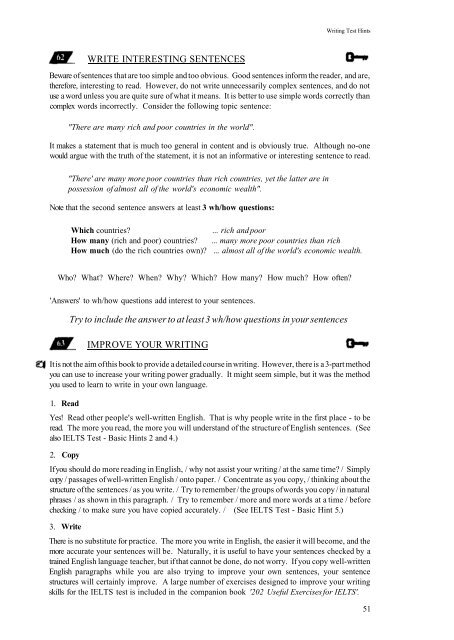Create successful ePaper yourself
Turn your PDF publications into a flip-book with our unique Google optimized e-Paper software.
Writing Test <strong>Hints</strong><br />
WRITE INTERESTING SENTENCES<br />
Beware of sentences that are too simple and too obvious. Good sentences in<strong>for</strong>m the reader, and are,<br />
there<strong>for</strong>e, interesting to read. However, do not write unnecessarily complex sentences, and do not<br />
use a word unless you are quite sure of what it means. It is better to use simple words correctly than<br />
complex words incorrectly. Consider the following topic sentence:<br />
"There are many rich and poor countries in the world".<br />
It makes a statement that is much too general in content and is obviously true. Although no-one<br />
would argue with the truth of the statement, it is not an in<strong>for</strong>mative or interesting sentence to read.<br />
"There' are many more poor countries than rich countries, yet the latter are in<br />
possession of almost all of the world's economic wealth".<br />
Note that the second sentence answers at least 3 wh/how questions:<br />
Which countries?<br />
... rich and poor<br />
How many (rich and poor) countries? ... many more poor countries than rich<br />
How much (do the rich countries own)? ... almost all of the world's economic wealth.<br />
Who? What? Where? When? Why? Which? How many? How much? How often?<br />
'Answers' to wh/how questions add interest to your sentences.<br />
Try to include the answer to at least 3 wh/how questions in your sentences<br />
IMPROVE YOUR WRITING<br />
It is not the aim of this book to provide a detailed course in writing. However, there is a 3-part method<br />
you can use to increase your writing power gradually. It might seem simple, but it was the method<br />
you used to learn to write in your own language.<br />
1. Read<br />
Yes! Read other people's well-written English. That is why people write in the first place - to be<br />
read. The more you read, the more you will understand of the structure of English sentences. (See<br />
also <strong>IELTS</strong> Test - Basic <strong>Hints</strong> 2 and 4.)<br />
2. Copy<br />
If you should do more reading in English, / why not assist your writing / at the same time? / Simply<br />
copy / passages of well-written English / onto paper. / Concentrate as you copy, / thinking about the<br />
structure of the sentences / as you write. / Try to remember / the groups of words you copy / in natural<br />
phrases / as shown in this paragraph. / Try to remember / more and more words at a time / be<strong>for</strong>e<br />
checking / to make sure you have copied accurately. / (See <strong>IELTS</strong> Test - Basic Hint 5.)<br />
3. Write<br />
There is no substitute <strong>for</strong> practice. The more you write in English, the easier it will become, and the<br />
more accurate your sentences will be. Naturally, it is useful to have your sentences checked by a<br />
trained English language teacher, but if that cannot be done, do not worry. If you copy well-written<br />
English paragraphs while you are also trying to improve your own sentences, your sentence<br />
structures will certainly improve. A large number of exercises designed to improve your writing<br />
skills <strong>for</strong> the <strong>IELTS</strong> test is included in the companion book '202 Useful Exercises <strong>for</strong> <strong>IELTS</strong>'.<br />
51




